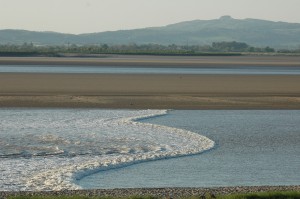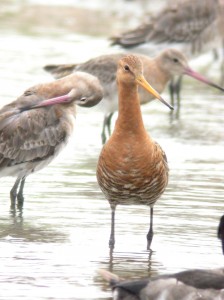Parliamentarians strike off Severn Barrage concept

MPs and environmental groups have united in their call for the Severn Barrage concept to be abandoned, calling instead for a renewed focus on environmentally sound and commercially viable way to harness a variety of sources of power in the Bristol Channel.
A week after the Energy and Climate Change Select Committee delivered its damning verdict of the latest scheme for a Severn Barrage in their report, A Severn Barrage?, three all-party parliamentary groups (APPGs) met to review the arguments for barrage technology, to gauge whether the risk to wildlife, biodiversity and the success of the UK’s ports economy was one worth taking, and to think about the way forward in light of the Select Committee’s conclusions.
The Severn is Britain’s largest estuary and an outstanding landscape which supports significant communities and industries alongside internationally important habitats and populations of birds and fish.

Its huge tidal range – the second highest in the world – creates the famous Severn Bore and gives the Severn the potential to be the global home of tidal power. However, environment groups say that successive governments have been distracted from potential viable and environmentally acceptable options for exploiting this power by plans for a big barrage.
The MPs were shown a short film screening which looked at the lessons learnt from the La Rance dam in France – the only other large scale barrage project in Europe. They were also briefed on the impacts of a barrage on wildlife which last week’s Select Committee report concluded would be ‘very considerable’
Charles Walker MP, Vice-Chair, APPG Angling, said:
“On behalf of my parliamentary colleagues, I thank the environmental groups for bringing the devastating La Rance experience to our attention. The effects on the biodiversity, the local people and the local economy are striking. It is no wonder that this form of power generation has been considered and dismissed by other countries – from Canada and France to South Korea. The UK government should forge ahead with its support for sustainable energy generation, but not a damaging barrage concept.”

The session, Is a Severn Barrage really the way to harness the energy of the tides?, was hosted by the APPG on Angling, the APPG on Conservation and Wildlife, and the APPG on Maritime and Ports on Monday 17th June and was well attended by MPs from England and Wales.
Commenting after the session, Madeline Moon MP, Vice-Chair, APPG Conservation and Wildlife, said:
“The ecologically important River Severn and its estuary belongs to us all. We must proclaim loud and long that the rich diversity is not for sale, not for destruction, not for large scale development. We are however willing to negotiate to share its water bounty for sustainable, ecologically sound energy generating schemes and look forward to a new era of cooperation and creative endeavour.”
Julian Brazier TD MP, Chair, APPG Maritime and Ports, said:
"I've been taken aback by how united the opposition is to the Hafren Power proposal for a Severn barrage, from ports either side of the Bristol Channel and marine aggregate companies to Government agencies and environmental groups. Fuelled by farfetched claims on a range of matters, from 'fish friendly turbines' to improvements in flood defences, I have seldom encountered an issue in my parliamentary career that simply does not add up on so many fronts. The Maritime and Ports APPG will be following up the excellent Energy and Climate Change Committee report with the Government to make sure that the agenda moves on from the dated idea of a dam across the estuary."
 The primary topics under discussion were the effects of a barrage across the Bristol Channel from Cardiff to Weston-super-Mare, and the potential for harnessing the energy from the estuary in an incremental and more environmentally friendly manner. Speakers included Jonathan White - Severn Rivers Trust, Kate Jennings - the RSPB, John Gowdy - REGEN South West and Martin Salter - Angling Trust.
The primary topics under discussion were the effects of a barrage across the Bristol Channel from Cardiff to Weston-super-Mare, and the potential for harnessing the energy from the estuary in an incremental and more environmentally friendly manner. Speakers included Jonathan White - Severn Rivers Trust, Kate Jennings - the RSPB, John Gowdy - REGEN South West and Martin Salter - Angling Trust.

